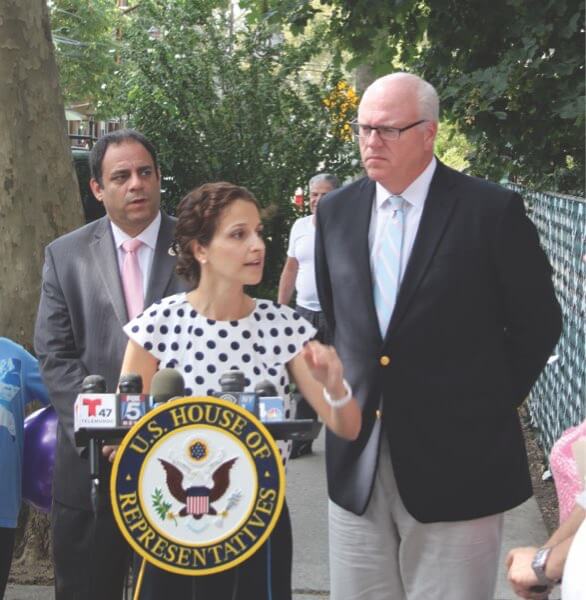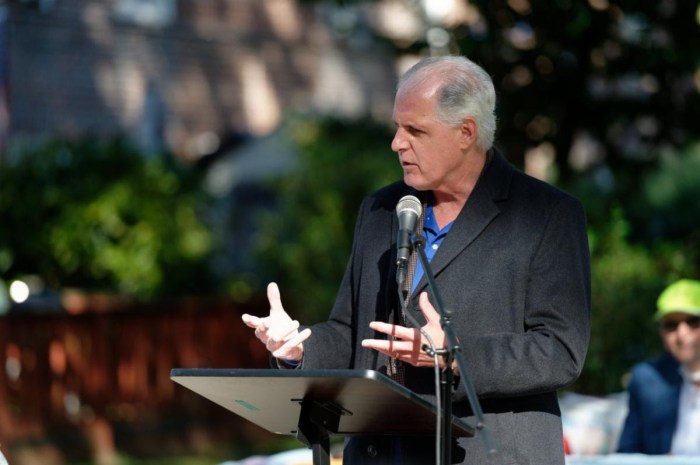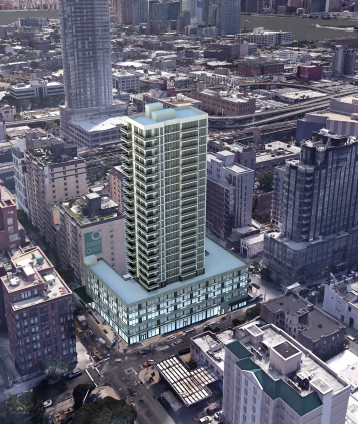By Mark Hallum
Many of the residents living under the right-of-way of the Hell Gate Bridge in Astoria have been renting the land adjacent to their homes since the 1940s at nominal fee from Amtrak in return for maintaining the property.
The quasi-governmental agency has allowed its renters to make use of the land, such as installing fencing, landscaping and hosting family gatherings. But in early August, tenants were shocked to be informed their rent would be increasing by as much as 100,000 percent.
U.S. Rep. Joseph Crowley (D-Jackson Heights), state Assemblywoman Aravella Simotas (D-Astoria) and Councilman Costa Constantinides (D-Astoria) spoke to reporters last week to demand answers from Amtrak about the astronomical rent increases for Astoria residents.
Held in front of the Paratore family home at 22-38 23rd St., the press conference gave the family, along with their neighbor Loretta Csikortis, of 22-52 23rd St., the chance to speak about the decades of care they had put into the land adjacent to their homes.
The Paratore family—Anthony, Michael, Mary and Rose—were born and raised in the single-family home their grandfather purchased in 1946. At the same time, he leased the plot of land next to the home from Amtrak. Both the home and the land next to it are below the right-of-way leading to the Hell Gate Bridge.
The rent on the land next to the house had not been raised since 1973. This all changed in early August when the Paratores and other residents received a letter from Amtrak informing the tenants their rent would be increased by as much as 100,000 percent starting in September.
According to Anthony Paratore, his grandfather, who leased the land following his service in World War II, went through the trouble of planting a fig tree which his grandchildren still enjoy, a sign of intended permanence.
For the Paratore family, rent was $25 per year. Now Amtrak plans to have it raised to $26,560 per year, which translates into $2,213 a month. Csikortis, who also lives in the home where she was born, said the rent on the land she has used to develop an enviable backyard with a deck and swimming pool is going up from $50 per year to $40,000 per year.
Under the lease agreements signed with Amtrak the tenants, who invested heavily in the land, were responsible for the upkeep of the property in return for rent at a nominal fee. Now that has changed.
“These are the kinds of tactics we expect from slumlords, not from Amtrak. The truth is Amtrak is railroading hardworking families into renewing a lease with an unprecedented and obscene rent increase, and that’s just not right,” Crowley said. “These homeowners are doing the job that Amtrak has a lousy track record of doing—maintaining their property. Amtrak claims the premises are substantially undervalued, but what’s clear is that the longstanding members of our community are the ones who are truly undervalued in this situation.”
The congressman urged Amtrak to “not just be a better landlord, but to be a better neighbor and treat our homeowners reasonably and respectfully.”
Crowley said the rent hikes do not just apply to the Paratores or Csikortis, but are a problem facing Amtrak tenants all along the corridor under the railroad tracks.
Reach reporter Mark Hallum by e-mail at mhall



































